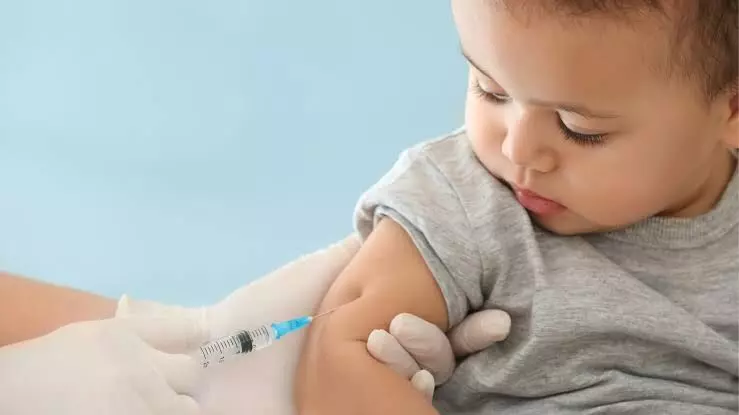National Infant Immunization Week: How inoculation can prevent life-threatening diseases
Stigma and fear prevail in certain sections of society over the vaccinations
By Neelambaran A
Representational Image.
Vaccination plays an important role in protecting individuals and community from serious diseases, eliminating life threatening diseases and preventing outbreaks.
Vaccination has proved crucial in protecting children and adults from diseases like measles, polio, diphtheria, tetanus and hepatitis B.
However, stigma and fear prevail in certain sections of society over the vaccinations.
As part of the National Infant Immunization Week, observed from April 24 to 30, Dr Rajib Paul, Consultant general physician and internal medicine specialist, Apollo Hospitals, Jubilee Hills, Hyderabad, explains in detail about the importance of vaccination, schedule, health risks associated and its remedies along with the government facilities available. Excepts:
NM: Why is vaccination important for overall health and disease prevention?
Dr Rajib Paul : Vaccination is a cornerstone of public health, playing a critical role in preventing the spread of infectious diseases and safeguarding overall health. Vaccines stimulate the immune system to recognize and combat pathogens without causing the disease itself while protecting the individual and creating herd immunity.
In India, the Universal Immunization Programme (UIP) has significantly reduced the incidence of vaccine-preventable diseases, including the reduction in measles, contributing to the decline in child mortality rates.
According to UNICEF, immunization prevents approximately 2-3 million deaths annually worldwide, and in India, it has been instrumental in eradicating diseases like polio.
The impact of vaccination extends beyond individual health, reducing healthcare costs by preventing diseases that would otherwise require expensive treatments and hospitalizations.
The World Health Organization (WHO) estimates that every dollar spent on childhood immunization returns up to $44 in economic benefits.
NM: When should vaccines be taken, and what is the recommended schedule?
Dr Rajib Paul: Vaccination schedules are meticulously designed to provide immunity at the optimal time in a child's development. For infants and children, vaccines are typically administered at birth, 6 weeks, 10 weeks, 14 weeks, 6 months, 9 months, 12 months, 15 months, 18 months, and 4-6 years.
The UIP provides a comprehensive schedule that includes vaccines for tuberculosis, polio, hepatitis B, diphtheria, pertussis, tetanus, Haemophilus influenzae type b, rotavirus, measles, and rubella. Adhering to this schedule ensures timely protection against these diseases, reducing the risk of outbreaks and severe health complications.
For example, the Bacillus Calmette-Guérin (BCG) vaccine is given at birth to protect against tuberculosis, while the pentavalent vaccine, which protects against five major diseases (diphtheria, pertussis, tetanus, hepatitis B, and Haemophilus influenzae type b), is administered at 6, 10, and 14 weeks. The measles and rubella vaccines are given at 9 months and 15 months, ensuring early protection against these highly contagious diseases.
Delays or missed doses can make children vulnerable to infections during critical periods of their development.
NM: What are the health risks and consequences of missing or delaying vaccinations?
Dr Rajib Paul: Missing or delaying vaccinations can have severe health consequences since unvaccinated children are at a higher risk of contracting and spreading vaccine-preventable diseases.
Delaying vaccinations can also compromise herd immunity, putting vulnerable populations, such as infants, elderly individuals, and those with compromised immune systems, at greater risk. Diseases like pertussis (whooping cough) can be particularly dangerous for infants, leading to severe respiratory issues and even death.
Therefore, maintaining the recommended vaccination schedule is crucial for individual and public health. In India, outbreaks of diseases like diphtheria and measles have been reported in areas with low vaccination coverage.
According to the National Family Health Survey (NFHS-5), only 62% of children aged 12-23 months were fully immunized in 2019-2020. This indicates a significant gap in vaccination coverage that needs to be addressed to protect public health.
NM: What facilities and vaccination programs are provided by the government?
Dr Rajib Paul: Several vaccination programs are rolled out by the government of India to ensure widespread immunization coverage. The UIP is one of the largest public health initiatives globally, providing free vaccines to all children across the country. The UIP covers vaccines for 12 diseases, including tuberculosis, polio, hepatitis B, diphtheria, pertussis, tetanus, Haemophilus influenzae type b, rotavirus, measles, rubella, Japanese encephalitis, and pneumococcal diseases.
The Mission Indradhanush initiative has significantly improved immunization coverage, contributing to the reduction of child mortality and morbidity rates. According to the Ministry of Health and Family Welfare, Mission Indradhanush has vaccinated over 37 million children and 9.5 million pregnant women since its launch in 2014.
The Intensified Mission Indradhanush (IMI) 2.0, launched in 2019, focuses on achieving 90% full immunization coverage across India and provides vaccination services through primary health centers, community health centers, and Anganwadi centers.
NM: Where can people access reliable information and services related to vaccination in Hyderabad/Telangana?
Dr Rajib Paul: The Institute of Preventive Medicine (IPM) in Hyderabad provides comprehensive vaccination services, including those for international travelers. Additionally, the Bharat Vaccine Centre and Children's Clinic & Vaccination Centre in Hyderabad offer a range of immunization services for infants, children, and adults.
Apollo Clinics and Apollo Cradle offer comprehensive immunization programs for infants and children. These facilities provide vaccines for diseases such as diphtheria, pertussis, tetanus (DTaP), polio (IPV), rotavirus, hepatitis B, and Haemophilus influenzae type b (Hib), among others.
Telangana Health Department and the IPM websites provide detailed guidelines, appointment booking options, and information on vaccination programs and facilities available in the region. Mobile health units and outreach programs are deployed in remote and underserved areas to provide vaccination services to those who may not have easy access to healthcare facilities.
By emphasizing the importance of vaccination, adhering to recommended schedules, understanding the risks of missing vaccinations, and utilizing government-provided facilities, we can ensure a healthier future for our children and communities.